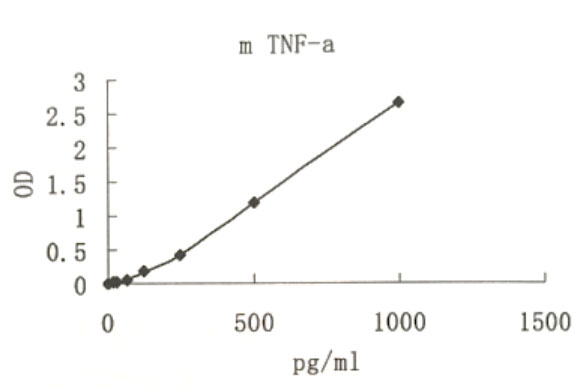Product Detail
Product NameMouse TNF-α ELISA kit
ApplicationsELISA
Species ReactivityMs
SpecificityNatural and recombinant Mouse TNF-α Ligand
Target NameMouse TNF-α
Application Details
Detect Range: 0.02 - 1.0 ng/mL
Sensitivity: 7pg/mL
Sample Type: Cell culture supernatant, serum, plasma (EDTA, citrate, heparin)
Sample Volume: 20 uL
Assay Time: 3 hour
Detection method: Colorimetric
The prototype ligand of theTNFsuperfamily, TNF-α/TNFSF1A, is a pleiotropic cytokine that plays a central role in inflammation and apoptosis (1-4).TNF-α is produced by activated macrophages and other cell types including T and B cells, NK cells, LAK cells, astrocytes, endothelial cells, smooth muscle cells and some tumor cells (5-8).
Mouse TNF-α cDNA encodes a 235 amino acid (aa) residue type II membrane protein (9). The 156 aa residue soluble TNF-α is released from the C-terminus of the membrane-anchored TNF-α by proteolytic cleavage by a matrix metalloprotease (10).
The membrane-anchored form of TNF-α has been shown to have lytic activity and may also have an important role in intercellular communication (11). The biologically active TNF-α has been shown to exist as a trimer (12, 13).TNF-α is reported to promote inflammatory cell infiltration by upregulating leukocyte adhesion molecules on endothelial cells, serve as a chemotactic agent for monocytes, and activate phagocyte killing mechanisms (14). Deficiencies in either TNF-α or its receptors can increase susceptibility to infection by intracellular pathogens (15-16). TNF- may also play a role in lymphoid tissue development. Knockout mice lack splenic B cell follicles and the ability to form germinal centers (17, 18). Other potential physiological roles for TNF-α and its receptors include regulating the differentiation of hematopoietic stem and progenitor cells (19-21).
If you have published an article using product EK0497, please notify us so that we can cite your literature.
et al,Asperuloside suppressing oxidative stress and inflammation in DSS-induced chronic colitis and RAW 264.7 macrophages via Nrf2/HO-1 and NF-kB pathways. In Chem Biol Interact on 2021 Aug 1 by Yong-Er Chen , Shi-Jie Xu et al..PMID:33974900, , (2021)
, (2021),
PMID:
33974900
et al,Abietic acid attenuates sepsis-induced lung injury by inhibiting NF-kB pathway to inhibit M1 macrophage polarization. In Exp Anim
on 2022 Nov 10 by Honglong Fang, Juan Chen, et al..PMID:35644586
, (2022),
PMID:
35644586
et al,Acinar ATP8b1/LPC pathway promotes macrophage efferocytosis and clearance of inflammation during chronic pancreatitis development. In Cell Death Dis
on 2022 Oct 22 by Wan-Jun Yang, Rong-Chang Cao,et al..PMID:36273194
, (2022),
PMID:
36273194
et al,Low-Dose Interleukin-2 Altered Gut Microbiota and Ameliorated Collagen-Induced Arthritis. In J Inflamm Res on 2022 Feb 25 by Na Li 1, Xuefei Li 1 et al..PMID:35241924
, (2022),
PMID:
35241924
et al,Melanin inspired microcapsules delivering immune metabolites for hepatic fibrosis management In Mater Today Bio On2023 Jun 24byXin Zhao , Zun Fan et al..PMID:37545558
, (2023),
PMID:
37545558
et al,Exosomes Derived from M2 Microglial Cells Modulated by 1070-nm Light Improve Cognition in an Alzheimer's Disease Mouse ModelIn Adv Sci (Weinh)On2023 NovbyChengwei Chen , Yuting Bao et al..PMID:37702115
, (2023),
PMID:
37702115
et al,Multifunctional manganese-based nanogels catalyze immune energy metabolism to promote bone repair
, (2025),
PMID:
More
et al,Protein-polysaccharide based nanogel/hydrogel composite with controlled continuous delivery of drug for enhanced wound healing.
, (2025),
PMID: 40049977
et al,Nature-derived microneedles with metal-polyphenolic networks encapsulation for chronic soft tissue defects repair: Responding and remodeling the regenerative microenvironment.
, (2025),
PMID: 40026624
et al,Acute lung injury induced by recombinant SARS-CoV-2 spike protein subunit S1 in mice.
, (2025),
PMID: 39972348



 YES
YES



